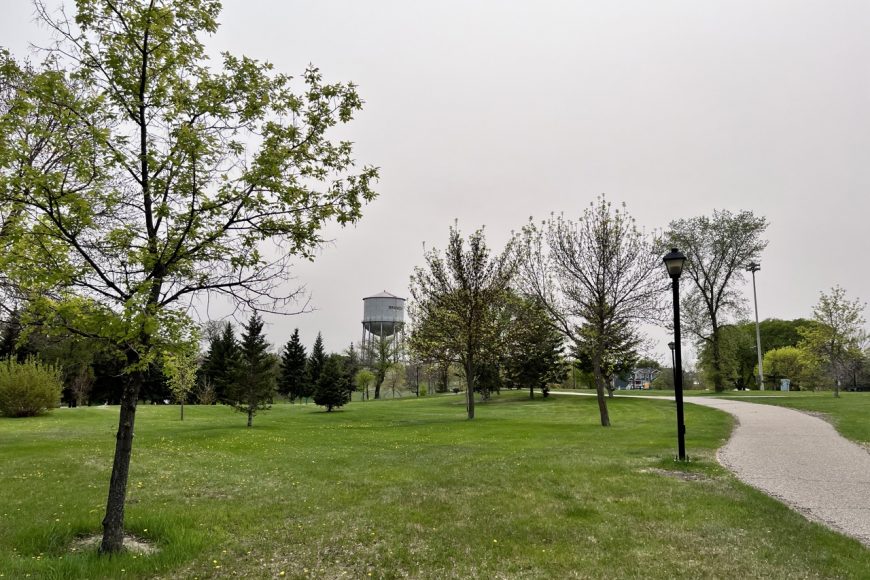A team representing Brandon University, the City of Brandon, and Prairie Mountain Health has been awarded federal funding to engage city of Brandon residents and national and world-class leaders in discussions about how to improve public spaces.
Their new project, called “Walking the Walk in Smaller Cities,” will involve listening to the community, learning from other cities in Canada and abroad, and developing recommendations from this combination of local and global voices.

The group’s first step, this summer, is to detail how people in Brandon are currently using active transportation (like walking and biking) and public spaces, as well as how people would like to use them, and the reasons they don’t. They will conduct a wide-ranging campaign online to listen for what’s most needed here in Brandon plus select in-person consultations to focus on specific groups. All planned research activities have been reviewed and approved by the BU Research Ethics Committee.
“This is a tremendous opportunity for Brandon to be inspired by innovative urban infrastructure in other places, to find ways of improving our meeting spaces and to increase opportunities for everyone to move through our city,” said Dr. Rachel Herron, the Brandon University researcher who is leading the project. “Whether you are eight years old or 80 years old, whether you are walking, biking or using a wheelchair, Brandon’s public spaces should be welcoming for everyone.”
Dr. Herron, director of BU’s Centre for Critical Studies of Rural Mental Health and the Canada Research Chair in Rural and Remote Mental Health, is lead researcher on the project. She’s joined by Brandon Mayor Jeff Fawcett, the City’s Director of Planning Ryan Nickel, a Medical Officer of Health from Prairie Mountain Health, Dr. Amy Frykoda, and BU’s Director of Marketing and Communications, Grant Hamilton, who is also founder of local safe cycling group Bike Brandon. The team has also hired a research assistant, Jared Friesen, to help with intensive community engagement sessions throughout the summer.
The “Smaller Cities” project in Brandon is one of four similar projects that have been funded across the country, and the Brandon team is liaising with teams in Guelph, Oshawa, and Saskatoon to share strategies and solutions.
The federal funding will also send all four teams to a global workshop in Copenhagen this fall, where they will explore world-class examples of active transportation, public space, and greenspace, and then share that knowledge broadly back here in Brandon.
“Brandon has incredible potential to be a livability leader on the Prairies,” said Mayor Fawcett. “We will learn from some of the best examples in the world, figure out the best way to apply it here in Brandon — and put ourselves on a path to inspire other cities.”
A shift to better supporting public spaces and active transportation, which includes walking and biking, is one of the major themes proposed in Brandon’s forthcoming City Plan 2050 and is a highlight of both council’s recently approved strategic plan and the city’s new Climate Change Action Plan.
Walking, biking, parks and plazas are proven economic boosters that are among the most affordable investments a community can make. These public facilities also foster a healthier and happier population.
“Being active is one of the simplest and most effective ways to support good health for all of us,” Dr. Frykoda said. “As a community, we thrive when we do everything we can to make it easy for people to opt for healthy choices.”
The project complements Prairie Mountain Health’s overall strategic vision of health and wellness for all and builds on the organization’s longstanding work to address the social determinants of health and inequities — especially through community partnerships like this one.
At Brandon University, convening a three-partner group to improve tangible aspects of the City builds on the institution’s commitment to community-based research as well as its vision to be Canada’s Finest Regional University.
“There is a lot of optimism and possibility here in Brandon, as well as so much opportunity for partnership,” Dr. Herron said. “It’s not many places where you could pull together such an amazing team with senior City leaders, public health, and researchers as quickly as we did.”
An overview of the project was presented at Brandon City Council on June 5, 2023. Alongside this summer’s public consultations and focus group sessions, direct feedback can also be offered online at SmallerCities.ca, by email to SmallerCities@BrandonU.ca, or by connecting with any of the Smaller Cities Project social media accounts on Facebook, Instagram, LinkedIn, and Twitter.
The team will take what they’ve heard with them to the fall conference in Copenhagen, where they’ll be immersed in proven world-class solutions. Then, over the in winter, they’ll reconvene the focus groups to explore different Copenhagen-inspired solutions that might fit in Brandon, and how to adapt or translate those possibilities to the Canadian prairie context.
Finally, next spring the team will select and implement a chosen project that’s the best fit for Brandon and will tweak it over the summer in response to real-world use. In late summer or early fall of 2024, representatives from other smaller cities in Canada will be invited to Brandon to experience this success and share this solution as widely as possible.
This project has received $68,065 from the Canadian Institutes of Health Research through the Healthy Cities Research Initiative and is also supported by the Canada Research Chairs program, by Brandon University, by Prairie Mountain Health, and by the City of Brandon.
MEDIA CONTACT:
Grant Hamilton
Director, Marketing and Communications
Brandon University
204.571.8542
HamiltonG@BrandonU.c


